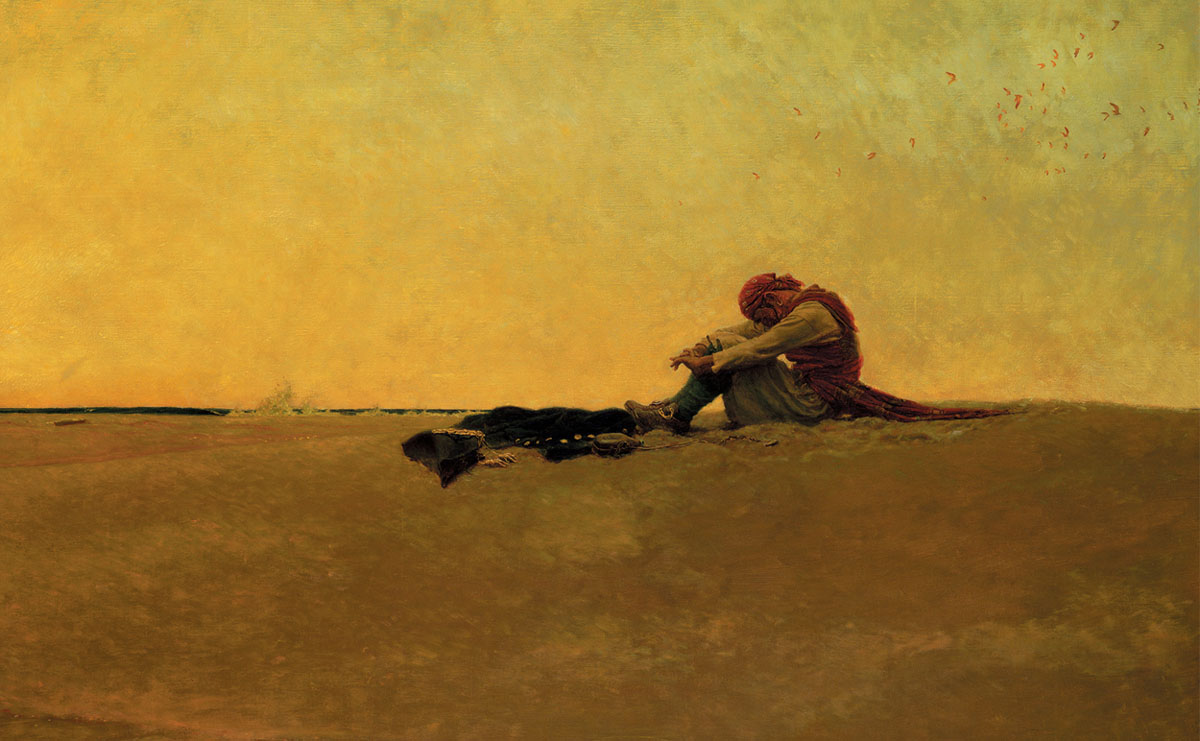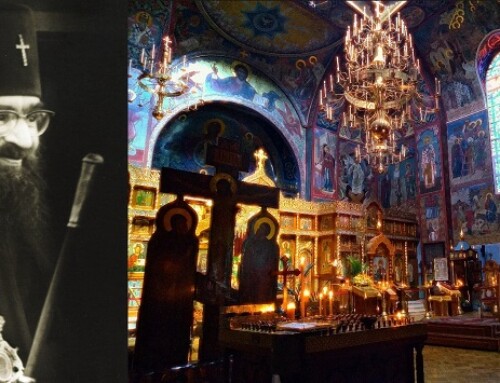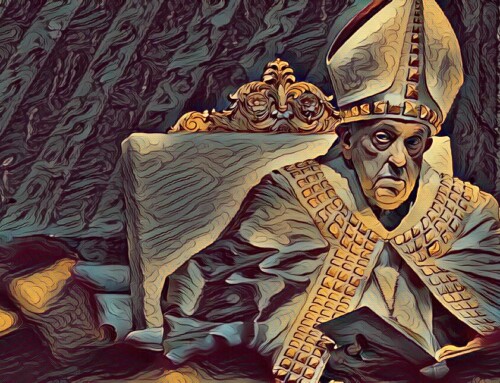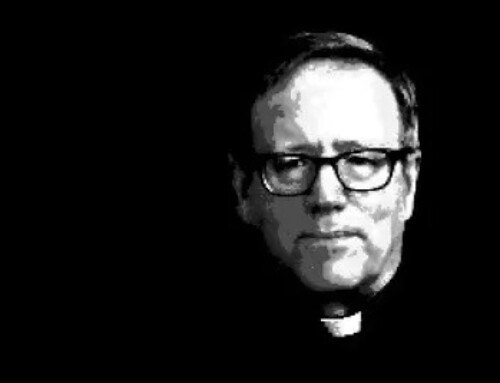Above: Marooned, Howard Pyle (1909)
During Judge Amy Coney Barrett’s confirmation hearings for the Supreme Court, she innocently referred to those with a “sexual preference;” according to the Human Rights Campaign, the correct term is “sexual orientation.” Sexual preference seems to imply a measure of choice, while orientation refers to a more immutable identity or trait. Barrett stated that she has “never discriminated on the basis of sexual preference and would not ever discriminate on the basis of sexual preference.” Instantly, politicians, activists, and social media commentators criticized Barrett for apparently using such an “offensive and outdated” term. Later, Barrett apologized: “I certainly didn’t mean and would never mean to use a term that would cause any offense in the LGBTQ community.”
This incident proves that an unapologetically pro-life Catholic can be confirmed to the Supreme Court, but even a small transgression, using a non-approved LGBTQ term, requires an immediate apology.
What are Catholics willing to fight for, and where are they willing to compromise?
The growing acceptance of the pro-life cause is largely due to the success of anti-abortion advocates who have created what some referred to as a “pro-life industry;” which I assume references the various visible and sometimes commercial accoutrements of a well-organized and well-funded political movement, including: high-profile marches, conferences, and movie and book-deals for its more famous figures.
Thank God that women have a place to share their stories about abortion; an often-seen placard carried by some at pro-life marches reads: “I regret my abortion.” Rightly, these women are heralded at such events for their bravery. Yet, someone who perhaps regrets a homosexual past – where is their support? There is no one to cheer them.
I can testify – there are few opportunities in society (or the Church) on the other side of gay.
In the Catholic Church, numerous parishes have active and vocal pro-life groups; as witnessed at the Annual March for Life in Washington DC. Many of the most fervent pro-life advocates are young Catholics; it seems that this demographic in the Church is increasingly pro-life, but also more pro-gay.
Fr. John Hollowell remembered:
“As I went through my first year of teaching, I was surprised to see how open most of the young people were to the teachings of the Church. However, I’ll never forget how hostile most of my seniors were when it came to the Church’s teaching on homosexuality.”
According to Pew Research: 85% of young Catholics believe that homosexuality should be accepted; 75% support same-sex marriage.
On June 23, 2018, Jesuit priest James Martin, who is the unofficial official spokesperson for all things LGBT in the Catholic Church, stated via social media:
Be proud if you are an LGBT Catholic. Know that God created you and loves you more than you can imagine. If you are a parent of an LGBT Catholic, know that God loves you too, and that you and your child are welcome in the church. #pride
Fr. Hollowell’s statement, the results of the Pew survey, and the constant assertions from Martin about how “God made you like that,” are a testament to just how far some of the basic tenets of LGBT dogma have infiltrated inside the Church; namely – that gay men and women were born that way; hence the apology of Amy Coney Barrett. These changes begin in rather subtle ways – for example, Martin’s repeated protestations concerning the inclusion of “intrinsically disordered” in the Catechism; according to him, it should read: “differently ordered.”
Words are important and they have meaning; for this simple reason, a once rather obscure Canadian psychology professor became world-famous, because he refused to submit to so-called “compelled speech.” Jordan Peterson wrote: “Truth reduces the terrible complexity of a man to the simplicity of his word.”
When I returned to Catholicism in 1999, I wasn’t surprised to find a Church, at least inside the Archdiocese of San Francisco, that was largely pro-gay; in the midst of the AIDS crisis, the priests who served in parishes near the gay-neighborhood, buried our dead; later, they “blessed” the marriages of those who survived. As a kid, I never heard anything concerning what the Church taught about homosexuality; except when an overly-friendly priests told me that “God made me gay.” Since then, the outward symbols of the modern gay-liberation movement had been incorporated into the ministries that the Church created for those precious few who identify as LGBT, but still feel some draw to the Catholic faith; the rainbow-flag hung outside the front-door, the priests offered a “Pride” mass every June, and the works of renegade gay Jesuit John J. McNeill were regularly featured at the parish book-club.
At first glance, what the Church offered was almost exactly the same talking-points I heard in the secular LGBT community – with the trappings of Catholicism; for instance, a “queer” Stations of the Cross. For the most part, the resonant message sounded something like this: God made you gay; God doesn’t make mistakes; right now, the Church doesn’t accept same-sex relationships, but that will change; in the meantime, stay in the Church and we will support you.
My life, it seems – had always been marked by the extremes; at 18 years of age, I made a rather decisive and extreme (at the time) decision to live my life as a gay man; over 10 years later, I was making another radical choice – I decided to question everything I once believed. Because those precepts which I formed my life around, had failed me; I saw it in the graves of those who died far too young. Without a drastic change in my trajectory, I believed I would soon join them.
Tragically, there was nothing in the Catholic Church that would have stopped my downward slide; at best, it might have delayed the inevitable. During my first conversation with a Catholic priest, following my attempted escape from San Francisco, he invited me to meet another single-gay man at the parish.
To the credit of the Church, primarily through the tireless efforts of laymen and women, there is large apparatus awaiting women who are pregnant and experiencing difficulties at home or in their life; there are pregnancy crisis centers, hotlines, and from coast-to-coast, women’s advocates are often stationed outside Planned Parenthood clinics – often spiritually supported by a company of prayer-warriors; every year I struggle to find 1 or 2 volunteers willing to accompany me and a box of free Rosaries to the annual “Pride” parade in San Francisco.
On the true margins of the Church, I found a few faithful priests who didn’t apologize for proclaiming the word of God; in fact, their steadfast dedication had pushed them to the periphery while their more popular, seamless-garment counterparts were enshrined in downtown cathedrals and wealthy suburban parishes; they didn’t have an eloquent grasp of the constantly shifting LGBT terminology, but they spoke the truth. They recognized my frustration; one priest recommended a ministry I had never heard about: Courage.
I tracked down the chapter in San Francisco, spoke to the priest chaplain over the phone, and he provided me with the time and the whereabouts of the next clandestine meeting. Located in a dank and dusty windowless subbasement of the Cathedral, the Courage meetings were a revelation to me; although I found the somewhat strict structure of the meetings to be overly regimented, at least I met other men who similarly found the gay existence rather lacking. I wasn’t crazy, I thought.
I semi-regularly attended meetings for a couple of years, and then I stopped. I didn’t really make a conscious decision to cease going, I just got tired of being in the catacombs – not under pagan Rome, but beneath my own Church.
For this reason, I have watched with sadness as some of the men I knew in Courage, drifted back to the gay male community or to the LGBT-affirmative parishes. Sometimes due to their own loneliness, but also, I think, not because they found that the Church condemned them, but that the Church simply didn’t care.
The advances made by the pro-life movement, especially in terms of acceptance and visibility, have been truly remarkable; in fact, it should serve as a model for all ministries that wish to help the vulnerable. But in terms of the LGBT issue, the Church has capitulated; “rainbow” ministries are plentiful across the American Catholic Church; in some parishes, they operate almost unnoticed, beside the pro-life marchers and the Rosary society.
46% of gay men were molested as children, yet we have left them to fend for themselves; would the Church hand-over a sexually abused young woman to an abortion mill?
As far as I am concerned, the loud and proud gay-affirmative pro-LGBT priests and prelates are the Catholic equivalency of Kermit Gosnell. The death of the human soul, in my mind, surpasses the destruction of the body. In the Catholic Church, the butchers have been allowed to slaughter the confused, the lost, and the unwitting.
In my estimation, the preeminent issue of the Church in the 21st Century is not abortion – its identity. Very few priests and bishops have had an abortion, but many are indelibly linked to homosexuality. For this reason, at best, they are reticent to even mention, let alone proclaim, the Church’s teachings on same-sex relationships. As a result, the teachings begin to merely exist on paper – as a sort of ignored fragment of an antiquated past.
Consequently, only a small handful of bishops are compelled to state the obvious: a Catholic priest should not participate in a same-sex wedding; Catholics should not attend “Pride” events; priests should not encourage same-sex relationships. Later, one of them semi-walked back his statement when he said: “I regret that my comments yesterday…have turned out to be so controversial in our community, and offensive to some, especially the gay community.” Another bishop, known for his media presence and vocal pro-life advocacy, quickly folded when asked about same-sex marriage.
The truth is never offensive.
All the way back in 1986, the Vatican lamented the fact that so many priests and prelates were actively encouraging and welcoming LGBT-affirmative ministries into their parishes and dioceses; to my knowledge, no comparable document has ever been issued which made a similar admonition about organized pro-abortion advocacy in the Church. The reasons for this disparity are complicated and somewhat varied, but Catholics, in general, are more accepting of homosexuality than abortion because abortion is not an identity. As a compliment to pro-life advocates, they are able to simultaneously condemn the act of abortion while reaching out with love and compassion towards those who procure them; I don’t know, but maybe Catholics have not figured out how to do that with homosexual activity and those who identify as gay or lesbian. In many instances, emotionalism has overruled the eminent need to act decisively – without apology; lives are being lost. Is the life of an unborn baby worth more than that of a gay man?
I think Bishop Joseph Strickland got it exactly right:
“Not calling a person away from sin is in fact condemning them to the destruction that sin brings.”






We must recognize that, beginning with the Council, and through the efforts of Charles Curran, and all the pro-sodomy, pro-abortion priests who have followed him, that the Catholic Church has been dismantled, except that the heretics did not leave the institutions or the buildings. The Catholic Church is not to be found in those institutions and buildings that have the word “Catholic” on the sign out front. The Catholic Church is elsewhere, and those who want to find it can find it.
The “Catholic Church” cannot be reformed. It is broken beyond repair. Writing letters and petitions to bishops is a complete waste of time. Complaining and exposing will not result in reform, but these activities may wake up some more people.
For the sacraments and other elements of the practice of the faith, seek out the Catholic Church in those places where it is hiding.
In 1974 the Congregation for the Doctrine of the Faith issued the Declaration on Procured Abortion.
The American bishops have never issued a similar document tailored to the situation in America, particularly adapted to our federal system of government. The American bishops have never issued any kind of moral instruction targeted at STATE officials. They have given no moral guidance to governors, prosecutors, or police regarding their constant complicity in abortion. This was especially clear during the pro-life rescue movement. The entire apparatus of law enforcement was mobilized to crush pro-life rescues, including in all those states with “pro-life” governor’s. No bishop gave anyone employed in this machinery any moral guidance whatsoever, with a single exception: Bishop René Gracida.
It is the duty of every governor in the nation to nullify the Supreme Court’s abortion decisions. The governors have received no instruction to this effect from the bishops.
Priests aren’t getting abortions, but there are many engaging in homosexual activities. Perhaps that has something to do with the lack of support for non-affiing lgbt minjstries.
Joseph, best thing I ha e read from you and I have read and listened to a lot. God bless.
“In my estimation, the preeminent issue of the Church in the 21st Century is not abortion – its identity.”. Joseph, I think you are spot on with this. I also think that unless the Church reclaims its own identity and purpose in leading souls to Heaven this will be the slippery slope to tolerance for evil beyond all telling.
It is my firm opinion that the preeminent issue for the Church should be neither. Moreover, the preeminent issue should always be mortal sin. The Church has long since stopped talking about mortal sin to its parishioners and the secular world at large. Mortal sin destroys salvation and the two mortal sins mentioned here, whilst both fit “Identity” categorisation definitely fit “mortal sin” better. With unrepentant mortal sin comes consequences of dire proportions.
Great article and comments! Thank you Joe and all. I would like to mention that it was very difficult to find, but once I did, Encourage has been very helpful and I have met very wonderful people. God bless you!
It is indeed true that the Church in America should do much more to promote the Courage apostolate. With so many high profile dissident LGBT allied organizations active in the Church, with the encouragement of some bishops and of course Fr. Martin, Courage must be promoted, and yes dissident groups and their promoters should be held to account.
the homosexual lobby bullied its way into the American Psychiatric association and foisted a lie on them. Now we see the lie on the news as if it were the truth. The kindest thing to say about homosexuals even today is that they have am mental illness.
I would note that it is obvious that when the bishops started admitting non-celibate, out of the closet gays to the priesthood that no good would come of it. I recall six decades ago when it was known that there were a number of gay priests in the Church but had the good judgement to stay in the closet. Unfortunately, since then there has evolved a position from “God loves you but hates the sin” to a simple “God loves you and we won’t discuss the sin.” This attitude does nothing to help those in the gay community and greatly damages any credibility of the Church and its teachings.
Joseph, I learn many things from you. Thank you. I have been disillusioned by the pro-life movement for some time. It seems like they make heroes out of women who choose not murder their children. That is twisted to me. And then they give her all the support she requests, both emotionally and materialy. However, when a person (especially a victim) turns from an unworthy life with little support from those commissioned to give that support, he should be the one heralded as the hero. You are to me. I hope your message gets told far and wide. And I hope we all can muster the courage to fight for the Truth. God bless you.
From my experience, working in the 1980s, at a prominent DC-based RC organization, where I routinely encountered clergy at the highest levels, I noted that male homosexuality was primarily viewed as a political core value: a form of radical chic, to coin an antiquated phrase. (Lesbianism was wholly ignored, on the other hand. In this setting, gay men suffered from too much “identity” and gay women perhaps from too little “identity” — to the point of invisibility).
I regret to say that the blatant fact of gay men in the Church was in my experience neither compassionately nor doctrinally considered by the clergy. In fact, wholly improperly, it was often considered quite callously from a prurient perspective. Likely, it is the Church that has the identity problem, not gay persons. Too many of the latter are authentically struggling mightily because the Church has sloughed off its identity, before Christ, to engage doctrinally, with agape love. The Church should consider leaving off the spiritually dangerous practice of (re)assigning people’s identities, and instead diligently concentrate its efforts on the resumption of its own immutable identity: that which is based in the saving of souls.
I am appalled that Jack Chick was right after all…